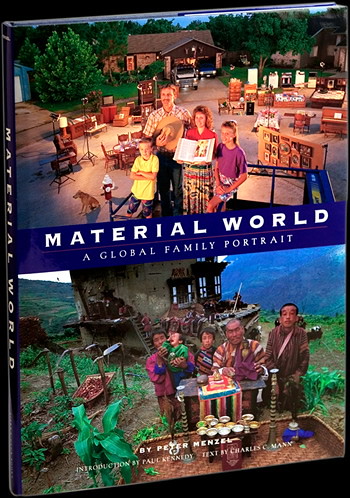and STUFF

In a recent post I showed some of the marvelous photos from a book called "Hungry Planet" by Pete Menzel who is an incredible photographer with much more to show us. His book on Material World consumption (pictured above) is outstanding. Food, fuel, folks and stuff are all connected in our ever-shrinking world where some have and some don't and most appear to either need or want more.
Now, globalization has brought something new -- a novel (to us) reality has emerged as the BRIC nations (Brazil, Russia, India, China) are racing into previously only-dreamed-of opportunities for economic development. Brazil, for example, is expecting an OPEC invitation because its newly discovered off-shore oil fields are among the largest reserves in the world. It is also emerging as the one of the leading global ethanol and food exporters. And all of this is being done by enhancing and further developing US-style energy and agricultural practices to a previously unimagined scale. For example, consider the fact that an average US Midwest farm is about 600-1000 acres in size whereas the new Mato Grosso farms in Brazil are averaging 20,000 acres in size -- that's 20,000 acres of intensive petro-chemical agriculture. And both country and city people are quite enamored of the opportunities for material consumption that the new prosperity may bring.
They are not going to be receptive to our preaching about how they need to do it in better ways unless that same "we" who set the bar are prepared to compensate them seriously for any lost or avoided economic opportunities. Brazil's Minister for Strategic Planning Roberto Mangabeira Unger put it succinctly, "We are taken aback by those who scold us, who warn us, since we see countries around the world that are talking from a high chair after having devastated their own forests."
Although the issue of "developed world" arrogance is not limited to its much-touted desire to save the rainforest, looking at the forest gives a most graphic comparison: the US presently has less than 10% of its original primary forests left while Brazil still has 80% remaining. And, it is very clear now that agricultural policies in the US (for example) have a tremendous impact on Amazônia in Brazil. Yet, the US has refused to take even minimal steps toward dealing with either deforestation or climate change. These contradictions contribute to a widespread popular distrust that the US and Europe are not really concerned about the forest but, instead, may be trying to capture its resources for themselves. Or, while giving lip-service to saving the rainforest, they are in fact (see links below) supporting policies that contribute to its destruction.
Global Commodities Boom Fuels New Assault on Amazon
Obama Camp Closely Linked With Ethanol
However, when it comes to the culture of runaway material consumption, the US has been the class leader, closely followed by western Europe and Japan. I do not find blame in this, we were simply the first to bat. But now we must face the developing world stepping up to the plate with an agenda of rising out of poverty and much more. They are starting to prosper and this is changing the old notion that "we" (the rich nations) have a moral obligation to help "them" (the poorer nations). It is becoming less about helping them and more about helping ourselves -- not to grab resources but to minimize the negative ecological consequences of the new reality of world economic development.
In the words of the columnist Roger Cohen, the world is being stood on its head. Very soon the BRIC nations are going to be determining our global future. Cohen points out that there is currently a $46.6 billion bid by a Belgian-Brazilian company for Anheuser-Busch, the maker of Budweiser. Can you imagine American Bud being owned by Brazil? The Brazilians can imagine it easily because their own leading beer and soft-drink conglomerates have been owned by Coca-cola and Pepsi for years. But now the world is changing, in previously unimagined ways. The World is Upside Down is a must read for anyone wanting to think of the future.
The Pax Americana empire that was established by US military dominance at the end of WWII and the subsequent US technological and trade dominance have brought to Americans the highest standard of living ever known on earth and also set the bar for the hopes and dreams for material advancement of much of the rest of the world.
Today the BRIC nations see great opportunity in doing things in a more efficient version of the established pattern of extracting, exploiting, producing, marketing and depleting. Can we expect them to do otherwise unless they are shown better practices being put into operation in the developed world? Can we expect them to adopt new practices unless the emergent "greener" technologies are shared and subsidized for the developing world.
Why should the developed world do this? For altruism or compassion or for doing good? No, they should do it for their own self-interest. If we want a world of people living more in balance with the earth we of the world of luxury are going to have face down-sizing whether we want to or not.
If we want the emerging economies to embrace a better planned, less wasteful and less disruptive (to us) path of development than we did (to them), we will have to offer a more meaningful route out of poverty and into prosperity. In other words, we will have to help each other. And what is it that we hold in common that might help us do this? It's the earth.






1 comment:
we used these pics in social studies to learn about different coutries!! so amazing but kinda sad!!
Post a Comment